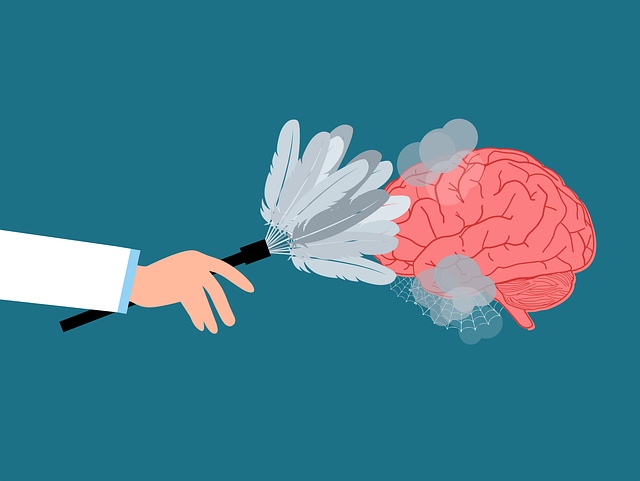Burnout among healthcare providers managing chronic conditions is a growing concern, leading to decreased productivity and physical health issues. Northglenn Chronic Illness Therapy addresses this through early intervention strategies, including Mental Health Awareness campaigns, stress management resources, and the Mental Wellness Podcast Series. They emphasize self-care as a vital strategy for mental wellness, promoting activities like exercise, meditation, and adequate sleep. Supportive initiatives at Northglenn include regular staff meetings, comprehensive training on stress management, and community outreach programs to reduce workload and stigma. These holistic approaches foster a healthier work-life balance for therapists, ensuring high-quality patient care.
Healthcare provider burnout is a growing concern, impacting both individual well-being and patient care. This article explores essential strategies to prevent burnout, focusing on self-care practices and organizational initiatives. We delve into recognizing early signals of burnout among healthcare providers and highlight successful examples, such as Northglenn Chronic Illness Therapy’s approach, which creates a supportive environment. By implementing these strategies, healthcare organizations can foster resilience and ensure sustained provider well-being.
- Recognizing Burnout Signals in Healthcare Providers
- Implementing Effective Self-Care Practices for Sustained Well-being
- Organizational Strategies to Foster a Burnout-Preventive Environment at Northglenn Chronic Illness Therapy
Recognizing Burnout Signals in Healthcare Providers

Burnout among healthcare providers is a growing concern, but recognizing the early signs can help mitigate its impact. Symptoms often manifest as a gradual decline in overall well-being and enthusiasm for work. Healthcare professionals may experience persistent feelings of exhaustion, cynicism towards patients or colleagues, and reduced professional accomplishment. These indicators, left unaddressed, can lead to more severe issues such as increased absenteeism, decreased productivity, and even physical health complications.
At Northglenn Chronic Illness Therapy, we understand the importance of early intervention. Encouraging mental wellness through initiatives like Mental Health Awareness campaigns and offering resources for stress management is key. Additionally, our Mental Wellness Podcast Series Production provides an outlet for professionals to share experiences, learn from one another, and gain insights into various aspects of mental health, including burnout prevention strategies tailored to their unique challenges.
Implementing Effective Self-Care Practices for Sustained Well-being

In the high-pressure environment of healthcare, burnout is a significant concern for providers, especially those managing chronic conditions like Northglenn Chronic Illness Therapy patients. To combat this, implementing effective self-care practices is paramount for sustained well-being. Mental wellness is not merely a luxury but an essential aspect of professional resilience. Healthcare workers should prioritize activities that nurture both physical and mental health, such as regular exercise, mindfulness meditation, and adequate sleep. These practices help reduce stress levels and enhance overall satisfaction in the job.
Northglenn Chronic Illness Therapy centers can play a crucial role in promoting self-care by offering resources like counseling services, stress management workshops, and mental health education programs design to meet specific needs. By integrating these initiatives into their routine, healthcare providers can improve their ability to manage challenging situations and maintain a positive outlook. In light of this, Mental Health Policy Analysis and Advocacy should focus on creating policies that support self-care, ensuring healthcare professionals have the necessary tools and time to prioritize their own mental health alongside patient care.
Organizational Strategies to Foster a Burnout-Preventive Environment at Northglenn Chronic Illness Therapy

At Northglenn Chronic Illness Therapy, organizational strategies are implemented to create a supportive and burnout-preventive environment for mental health professionals. These initiatives include regular staff meetings where open dialogue fosters collaboration and problem-solving. By promoting a culture of resilience, the therapy center encourages professionals to share experiences and offer mutual support, enhancing team cohesion and reducing individual workload.
Additionally, Northglenn Chronic Illness Therapy prioritizes risk management planning for mental health professionals through comprehensive training sessions on stress management techniques. They also implement community outreach program initiatives, such as educational webinars and support groups, to reduce the stigma surrounding mental health and alleviate additional pressures on staff. These holistic approaches contribute to a healthier work-life balance for therapists, ensuring they can continue providing quality care to patients effectively.
By implementing self-care practices and organizational strategies, such as those seen at Northglenn Chronic Illness Therapy, healthcare providers can effectively combat burnout. Recognizing early signals of burnout and fostering a supportive work environment are key to preventing this issue. Through sustained self-awareness and organizational commitment, healthcare professionals can maintain well-being and improve patient care outcomes.













